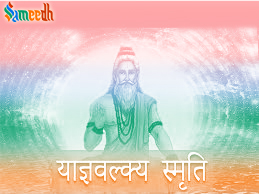The Yajnavalkya Smriti is another important ancient Hindu legal and ethical text, attributed to the sage Yajnavalkya. Like the Manusmriti, it belongs to the genre of Dharma Shastra and provides guidelines for righteous living and social order. Yajnavalkya is considered one of the most revered sages in Hindu tradition, and his teachings in the form of dialogues are presented in this smriti.

The Yajnavalkya Smriti is composed in Sanskrit, an ancient Indo-Aryan language that has been traditionally used for a vast body of Hindu religious, philosophical, and legal texts. Sanskrit has a rich literary tradition and is considered a sacred language in Hinduism. Yajnavalkya Smriti, like many other ancient Indian scriptures, is written in verse form and is characterized by its poetic and metrical structure.
The exact dating of the Yajnavalkya Smriti is challenging due to the lack of precise historical records, and there is some uncertainty regarding its composition date. However, it is generally believed to have been composed between the 3rd century BCE and the 3rd century CE. This places it within the same broad historical timeframe as the Manusmriti, another significant Hindu legal and ethical text.
Here are some key teachings of the Yajnavalkya Smriti:
- Dharm (Righteous Duty): Similar to other Dharm Shastras, the Yajnavalkya Smriti emphasizes the concept of dharm, which refers to one’s righteous duty and moral responsibilities. It outlines the duties of individuals based on their varna (caste) and ashram (stage of life).
- Varnas (Castes) and Ashramas (Stages of Life): The text provides guidelines for the four varnas (Brahmins, Kshatriyas, Vaishyas, and Shudras) and the four ashrams (Brahmachary, Grihasth, Vanaprasth, and Sannyas). It details the duties and responsibilities associated with each stage of life.
- Marriage and Family Life: The Yajnavalkya Smriti addresses the institution of marriage, including the rituals, responsibilities of spouses, and rules regarding inheritance. It provides guidance on family life, emphasizing the importance of maintaining harmony and fulfilling one’s familial duties.
- Legal Principles: Like other Smritis, this text contains laws and legal principles covering various aspects of life. It addresses issues related to property, contracts, and the administration of justice. The smriti outlines penalties for offenses and provides a framework for maintaining social order.
- Penance and Atonement: The text details the process of atonement for individuals who have committed sins or transgressed social and moral norms. It prescribes various forms of penance as a means of purification and spiritual progress.
- Economic and Social Ethics: Yajnavalkya Smriti discusses economic activities, trade, and social ethics. It provides guidance on ethical conduct in professional and social engagements, emphasizing honesty and fairness.
- Spiritual Knowledge and Liberation: The smriti touches upon the pursuit of spiritual knowledge (jnana) and the ultimate goal of liberation (moksh). It provides guidance on leading a life that incorporates spiritual practices and eventually leads to freedom from the cycle of birth and death.
- Duties of Kings and Administrators: Yajnavalkya Smriti contains teachings on the responsibilities and duties of rulers (kings) and administrators. It outlines principles for just governance and the protection of the welfare of the citizens.
It’s important to note that while the Manusmriti and Yajnavalkya Smriti share similarities in their emphasis on dharma, they may have differences in specific teachings and emphasis. Additionally, interpretations of these texts may vary among different schools of thought within Hinduism. It’s important to note that interpretations of the Yajnavalkya Smriti, like other ancient texts, can vary, and different schools of thought within Hinduism may emphasize certain teachings over others. Additionally, the practical application of these teachings has evolved over time as societal norms and values have changed.